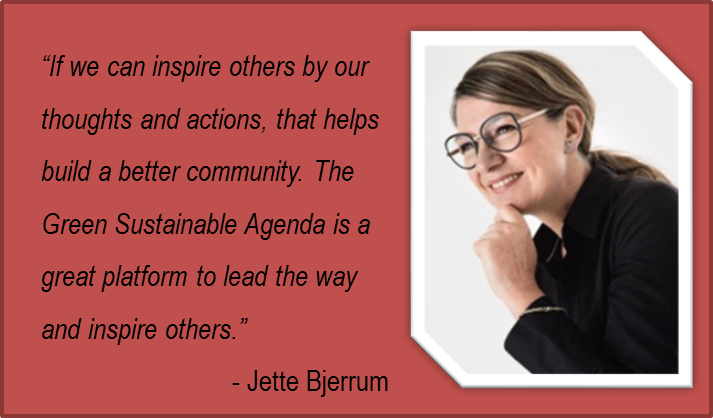Jette Bjerrum is the Consul General, Head of Trade & Innovation Centre, Denmark. She also oversees three commercial units namely; the Trade Council which focusses on export promotion to aid Danish companies in establishing their operations in India. The innovation centre act as a match maker between the Indian and Danish innovation ecosystems. And thirdly, the Invest in Denmark Hub, which cover Singapore and India investments to Denmark.
Her role is to enhance Danish collaborations and see them flourish even further. At current 150 Danish companies are established across India, with 25 of those based in Bengaluru area.
What brought you to Bengaluru and how has your experience been?
When I was in Denmark, I saw the job being featured and decided it was something I wanted to venture out into. I’ve spent over 30 years in the private sector, focusing on healthcare and renewable energy, so the position as Consul General and Head of Trade and Innovation Centre Denmark was a natural fit for me because I enjoy connecting with people, work internationally and am passionate about advancing sustainability initiatives.
What are some of the skills required in this role and how have you managed to bridge them being in a new place and exposed to diverse cultures?
I’ve spent a decade working with innovation, and my international leadership background only adds to my ability to learn about doing business in India. I’ve never been to India before, so the new role opens up new doors and opportunities to learn and to understand what drives business in India. This sincere desire to learn and improve encourages me to play an important role in enhancing Danish India relations.
Collaborations between Bengaluru and Denmark. Can you give us an idea of the current landscape?
Bengaluru is a very important hub for us. It’s a dynamic global hub for driving new technologies, the number of start-up’s are very high and access to talents are impressive. Bengaluru is the third largest innovation hub in the world and represents a global sandbox. Our aim is to bridge innovations and provide targeted solutions between the Danish and India ecosystem.
Joining a large market like India let them share their experience and provide solutions in a very cooperative and seamless manner. A deeper understanding of prevailing cultural sentiments and then adapt products and services into the India market is the need of the hour.
Please share some of the Consulate’s Commercial Collaborations with the Government of Karnataka.
In 2019 we were approached by the Government of Karnataka and an MoU was agreed upon between the Danish city of Aalborg, and Tumakuru under the program “100 Smart Cities of India”. We hope to expand this collaboration even further.
Also, we have been invited by the Government of Karnataka as Global Innovation Alliance Partner (GIA) and presented throught leadership and Danish innovations at the Danish track at the Bengaluru Tech Summit.
How does the New Age Partnership create close collaborations between India and Denmark?
This is a very special time for us. In September 2020 the prime ministers of Denmark and India agreed to elevate Indo Danish relations to a Green Strategic Partnership. Shri Modi called it the New Age Partnership. It will address the global challenges and promote solutions towards a greener and more sustainable future.
The collaboration will be of mutual benefit to create more jobs, improving people’s economic status, and investing in long-term solutions are some of the avenues that both countries can benefit, and this is what excites me.
For Danish Technology providers it is an opportunity to inspire and learn from the Indian ability to work at scale. In green energy transition, clean water solutions, healthcare, urban planning, education and science and technology.
What are some of the areas where solutions are offered to India and how has the response been?
Back in time, the main focus was on agriculture, manufacturing and operations of back office service centers. Also Denmark has been pioneers in the wind sector here in India. Going forward under the new Green Strategic Partnership, main areas are green energy, clean water, healthcare, education and joint research between Indian and Danish institutions and technology providers.
The Danish educational system, which includes vocational training courses, encourages universal access to education. As a result, we use our existing education approaches and skill-building projects to see what works on the ground in India and how we can cooperate in mutual fields. The Green Strategic Alliance is also assisting us in promoting these projects.
What does the Green Strategic Partnership mean to you?
If we can inspire others by our thoughts and actions, that helps build a better community. The Green Sustainable Agenda is a great platform to lead the way and inspire others.
To me it is a part of the Danish DNA, and I believe that bringing new ideas to the market is a fantastic way to enhance people’s quality of life around the world. We must ask ourselves this question on a regular basis – How can we improve the lives of people in a sustainable manner? And that is when we would have achieved the true spirit of collaboration.
The views and opinions published here belong to the interviewer and the interviewee and do not necessarily reflect the views and opinions of the publisher.



Be the first to comment on "Straight Talk with Jette Bjerrum"